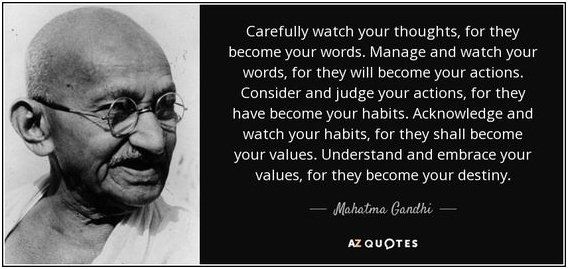Language Matters - Part 2
Thoughts are mostly formed as Questions & Statements

- What should I do if they ask me out?
- What dress should I wear?
- How big is the universe?
All or nothing thinking, it's rarely black & white!
Statements with global quantifiers that present as irrefutably true and accurate statements that are completely opinion based and where a person is using absolute terms is stating something as factual information that is highly unlikely to be accurate.
3. Statements that contain GLOBALISED QUANTIFIERS stated as facts rather than opinion.
I am sick of everything
I hate my life
This always happen to me
You’re always having a go at me
You never respect me
You do this all the time
Without explanation you already know these are not neutral statements, the globalised quantifiers rarely reflect reality. If we used language to reflect reality and not reflect our experience of reality, we would actually only use these when we said things like Day always follows Night, No one lives forever, Everyone needs water to live.
Okay, watch out for the VERB ‘to be’
There is something completely fascinating about the verb ‘to be’, Linguists may disagree with my terminology here because it is in an area where it crosses between literature and language. REALIS and IRREALIS, let’s just simply state that when we make comments using the verb ‘to be’ we are stating it as one hundred percent real.
I am
You are
He is
She is
They are
It is
You can start to see the accumulative effects of your language if you are using the above frequently to yourself in your head or out loud. Do not underestimate the effect of language on how you feel about yourself and how you feel about anything else in life.
I am always so pathetically unreliable and useless. I can’t get anything right! I might as well give up because it is always going to be like this.
- Do you know how you talk to yourself?
- Is there negation such as ‘don’t’?
- Are you using global quantifiers such as always or no one?
- Are you stating things as facts that are actually opinions, ‘it is never going to get better’?
I hope you don’t feel too down reading those examples, here are some ways you can use this understanding to use these methods for good instead:
I am growing and developing every day into the person I was always destined to become. I am confident and comfortable in who I am and I can create all the things that I really need in my life. My life is beautiful, and my soul is full of joy and gratitude.
You choose the words that best suit you, the words that are comfortable and sit with you without feeling too far out of your current area of comfort.
Action
1. Write down the questions in your head. Make a list and keep adding to it. Once you have it as data … DESIGN BETTER QUESTIONS
2. Tell it how it really is! DON’T USE GLOBAL QUANTIFIERS IF THEY DON’T REALLY APPLY
3. Look at the statements pretending to be questions. Notice them by recording them and reduce the emotional connection by observing them as data.
Stop Repeating Yourself
The NSF study demonstrated that of the 12,000 to 60,000 daily thoughts 95% are repeated and 80% are negative. Some negative thoughts are important for keeping us out of danger. However, 11 thousand times a day we are probably making statements of comparison or lack that use negation to focus on the lacking whilst masked as an innocent inquiry.
- Why don’t I fit in?
- Why does no one like me?
- Life is pointless.
Consider the Children
Here is an entry in an online psychology journal, CyberpsycholBehav Soc Netw (2014):
In 1998, Kraut et al. published one of the first studies to indicate that Internet use in general significantly affects social relationships and participation in community life.In this research, the authors found that increased time spent online is related to a decline in communication with family members, as well as the reduction of the Internet user's social circle, which may further lead to increased feelings of depression and loneliness. This work was later followed by several other publications where it was suggested that computer use may have negative effects on children's social development.
And I am not sharing this as one of the parents who has successfully maintained an earthy existence where technology did not take over their home. I wish I were that parent.
How does this affect us and our children RIGHT NOW?
Let’s recap. How did we get to computers?
Studies suggest that increased exposure to social media networks present a negative impact on children. Whilst in lockdown a proportion of children will be spending more time in virtual communication via social media platforms than pre-Covid. Logic supports that when out of the house in school setting face to face with added time on journeys etc. face to face interaction will increase and social media time be restricted by set schedules. Also, more ease in conversation is likely present in pre-Covid, as more eventful lives allow for more naturally occurring conversational topic shifts. Where previously 95% thoughts were repeated, it is possible with reduced variety in experiences repeated thoughts could increase as ultimately there is less inspiration for new thinking. In addition, studies indicate increased mental health concerns with increased use of social media platforms, it is plausible that higher levels of virtual interaction and social media usage could increase the possibility of negative thoughts. Now remembering that thoughts are internalised language, most often enacted as questions or statements, I am going to suggest that the only way to monitor the thoughts we or our children are having is by catching the abstract and turning it into something physical by drawing it out of the mindscape and into written form. Once we get thoughts out of the head and onto paper they can be dealt with as data. Emotional attachment can reduce through the writing process.
Journaling as a Therapy
You’ve seen the pretty vision boards on Pinterest and the pretty journals that are destined to change your world. But you don’t buy it or maybe you do, and you are working it daily but you didn’t know how many ways writing has proven helpful in improvements in health for patients. In the studies for the effectiveness of writing as a therapy the patients were not using primary options and this was a secondary alternative approach. Look at the list below and tell me journaling is just prettiness.
Examples of studies where writing therapy was beneficial;
- Improved disease severity and cognition in irritable bowel syndrome patients with longer term disease
- Reduction in resting blood pressure levels
- Improved walking speeds and affective pain in patients with rheumatoid arthritis
- Reduced anxiety and depressive symptoms amongst those with maladaptive rumination
- Reduction in depressive symptoms, trauma-related cognitions and general behavioural problems in children with post-traumatic stress disorder
- Improved physical symptoms and reduced healthcare utilisation in people with colorectal, breast, or prostate cancer
- Improvements in lung function in some studies of adults with asthma and a reduction in use of beta-agonist at 3-month follow-up
I will be making a blog entry entirely focused on the benefits of writing therapy and journaling but for now, just notice the list and create a habit of writing down what is good in your life, what is great in your life, what is a challenge in your life, what your concerns are. Get used to getting the ideas out of the abstract and into the physical. Look at it, as with your repeated thoughts, questions and statements in your head. Once you can step back and look at your MINDSCAPE you can see which are useful, which are not, and you can start to train for that gold medal. You can do that first virtual sit up where you did the work, you observed it and caught it and wrote it down so you could freeze it. Next time we will talk more about the research on why this helps.
Giving you the KEY
Literally, now that I have shown you one of the studied theories let’s make this actionable. You try it on you. All you need to do is keep a notepad and write down any thoughts you catch yourself having. Do not judge your thoughts. It is totally irrelevant at this stage what the thoughts are. We are simply establishing how your mind repeats thoughts and using energy doing so. After two days look at the list of repeated thoughts and note which are questions and which are statements. Note how many questions actually have presuppositions (ideas/expectations already formed), how many are actual brand new thoughts, how many are genuine questions that are looking for options, how many use global quantifiers such as all or nothing. How many of your thoughts are using the pronoun ‘I’, how many use ‘you’, ‘they’ or ‘it’. Make the list and see how the words make you feel. Then think on the below quote:
You probably heard quotes like this many times and perhaps thought it had a nice sentiment, but if you find that when you write down your thoughts you are still in the habit of using statements and questions that point your sails in an unhelpful direction, perhaps only now are you realising its significance and only now did you understand the action that you could take without needing anyone or anything other than you and your commitment to betterment. This blog is for you. It is to take the research; show it and then show how we can actually use it in a way that actually starts to create change and allows for you to see your choice every time you make it. Then with each time you catch yourself and practice the deliberate change in internal language then you are shifting the trajectory of your future and that of our children. In the next part I will show you how the research shows that the language we use is connected to our income, academic achievement and success as measured in various areas.












